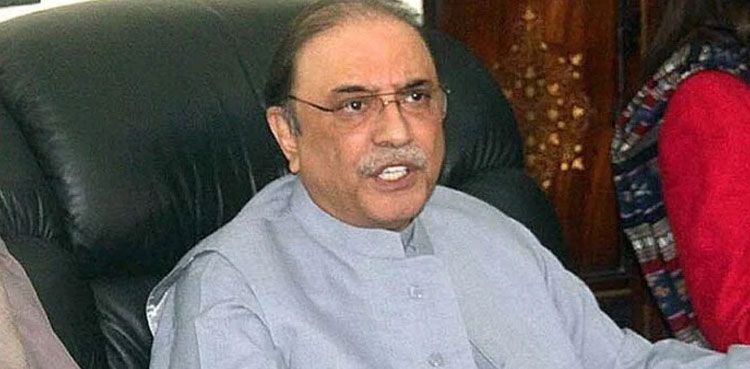Asif Ali Zardari has filed a plea for presidential immunity in the Thatta water supply project case. He took office as President for the second time on March 10, defeating SIC-backed candidate Mahmood Khan Achakzai. NAB nominated him and several others in the case for the illegal award of a contract. The hearing has been adjourned until April 22.

ISLAMABAD: Asif Ali Zardari on Thursday filed plea with the accountability court to seek presidential immunity in Thatta sater supply project reference, ARY News reported.
On March 10, Asif Ali Zardari took oath of the Office of President of Pakistan, for the second time in the country’s history. He defeated SIC-backed candidate Mahmood Khan Achakzai.
Asif Ali Zardari was a joint candidate of the ruling alliance including PML-N, PPP, MQM-P, IPP, PML-Q and BAP.
The president through his lawyer Arshad Tabraiz filed plea in the court of AC Judge Nasir Javed Rana. PPP co-chairman’s lawyer in his arguments before the court said proceedings in Thatta Water supply project case cannot move forward against his client as he enjoys presidential immunity.
Later the AC judge adjourned the hearing by issuing notice to the NAB for April 22.
It is pertinent to mention here that the National Accountability Bureau (NAB) had nominated Zardari, former secretary Ejaz Ahmed Khan, Ali Akbar, Ejaz Memon, Ali Akbar Abro, Khawaja Abdul Ghani Majeed, Manahil Majeed and Nadeem Bhutto in the reference.
According to the National Accountability Bureau (NAB), the case pertains to illegal award of a contract by the Special Initiative Department for water supply scheme, Thatta to a private contractor.
In recent news, there has been much discussion surrounding former Pakistan President Asif Ali Zardari’s decision to seek presidential immunity in the Thatta water supply case. This move has raised numerous legal questions and added complexity to an already contentious issue. With the aim of shedding light on this matter, it’s crucial to analyze the legal framework surrounding presidential immunity and its potential implications in the context of the Thatta water supply case.
At the heart of this issue is the question of whether a former head of state should be immune from legal action, particularly concerning allegations of misconduct or corruption. While the concept of immunity for high-ranking officials is enshrined in many legal systems to ensure the proper functioning of government, it also raises concerns about accountability and the rule of law. The Thatta water supply case presents a compelling case study for evaluating the balance between immunity and accountability.
Moreover, delving into the specifics of the case itself, it’s essential to examine the potential impact of Zardari’s bid for immunity on the pursuit of justice and the rights of the individuals affected by the water supply crisis in Thatta. This raises broader ethical and moral questions about the responsibilities of public figures and the imperative to uphold the well-being of citizens.
As the legal proceedings unfold, it is imperative for the public and legal experts to engage in thoughtful discourse on the implications of presidential immunity in this context. The intersection of law, politics, and public interest demands nuanced consideration, and it is incumbent upon all stakeholders to critically assess the ramifications of Zardari’s decision.
In conclusion, the matter of Asif Ali Zardari seeking presidential immunity in the Thatta water supply case underscores the intricate interplay of legal principles, ethical considerations, and the quest for justice. It is an issue of profound importance that warrants careful scrutiny and informed dialogue as we navigate the complexities of governance and accountability in the modern world.
Source: ARY NEWS
Asif Ali Zardari, the President of Pakistan, has filed a plea seeking presidential immunity in the Thatta water supply project reference. The plea was submitted through his lawyer, Arshad Tabraiz, to the accountability court. Zardari’s lawyer argued that proceedings in the case cannot proceed against his client due to his presidential immunity. The National Accountability Bureau (NAB) had nominated Zardari and several others in the reference, which pertains to the illegal award of a contract for a water supply scheme. The court has adjourned the hearing and issued a notice to the NAB for April 22.
Disclaimer:
This content is AI-generated using IFTTT AI Content Creator. While we strive for accuracy, it’s a tool for rapid updates. We’re committed to filtering information, not reproducing or endorsing misinformation. – Khabristan.pk for more information visit privacy policy








Leave a Comment